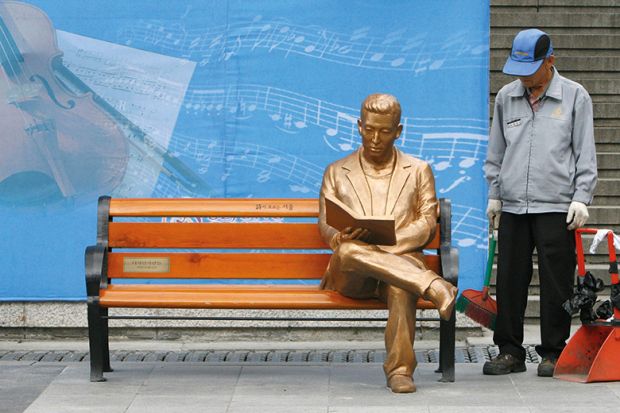One of South Korea’s most prestigious institutions has become embroiled in pay disputes with its language institute and its cleaning staff, causing lecturers and students to express dismay about its treatment of employees.
Ongoing wage disagreements between administrators and teaching staff at Yonsei University’s Korean Language Institute (KLI) have yet to be resolved despite numerous attempts at negotiations since last December as well as a partial strike by instructors. Meanwhile, the university’s cleaners continue to protest over wages and work conditions, most recently drawing media attention when they were sued by some students for allegedly disrupting classes.
Yonsei’s response to both issues has prompted frustration among university faculty members, who said the disagreements were longer-term problems that needed to be resolved.
Jieun Lee, an assistant professor of anthropology at Yonsei, said that as a faculty member and university alumna, she was “deeply disappointed” by the administration’s lack of public explanation for the wage issues.
The handling of the dispute with cleaning staff had been “irresponsible”, she added.
Dong-no Kim, a chemistry professor at Yonsei, noted that the issues affecting Yonsei were also at play at other Korean institutions, adding that protests could soon spread elsewhere, as has happened in the past.
“The basic problem underlying this conflict is the limited financial resources of Korean private universities,” he said. “With no increase of tuition for more than 10 years and almost no governmental subsidies for university daily expenses, the financial situations of Korean universities are very tight and limited.”
Already, the language institute disputes have had a negative impact on the student experience there, said Nathan Kim, a final-year student at Yale University who took courses at Yonsei over the spring.
“Students were constantly unsure of what our next assignment or grade would be like, and especially so for the final exam,” he said, referring to a late-semester announcement that students would sit a multiple-choice exam that would count for their entire semester grade.
He said teachers were “kept out of the loop” by administrators, which “made for a frustrating time as we were not sure what our grades would look like [and] could not really ask teachers as they did not know much more than us”.
But some academic staff were sceptical that the ongoing conflicts would seriously affect the university’s standing.
“I don’t really think Yonsei is too worried about the hit to their reputation as they continue to be one of the highest-ranked institutions academically – and in Korea that trumps everything,” said one lecturer, who asked to remain anonymous.
She doubted that the protests would gain traction if other departments did not get involved.
“I know that the language institute is not really seen as part of the university, is [seen as] a moneymaker from foreign students, and the Korean language teachers are not given nearly the respect as tenured or tenure-track faculty, even though some have PhDs.”
A spokesperson from Yonsei University told Times Higher Education that language instructors with union membership have called for a 48 per cent pay raise and that “Yonsei KLI has handled these events well, despite financial difficulties” caused by the pandemic.
She said Yonsei’s treatment of part-time language instructors has been “top tier in terms of wages and benefits compared to part-time instructors in Korean language education institutions at other universities” and defended the language institute’s management of the student experience.
“In spite of a partial strike, Yonsei KLI tried its best to come to a ‘successful completion’ of the 2022 spring semester, and we will continue to do our best to resolve the ongoing situation,” she said.





